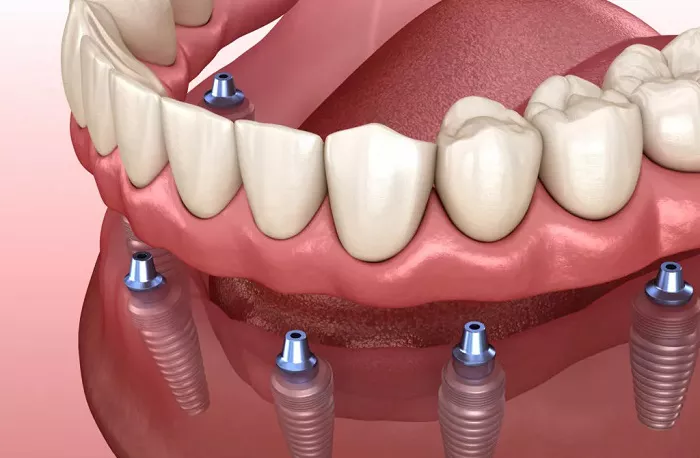When it comes to replacing missing teeth, dental implants and dentures are two of the most popular options. Both have their advantages and disadvantages, and the best choice depends on your specific needs, lifestyle, and budget. This article will provide a detailed comparison of dental implants and dentures, helping you make an informed decision about which option is better for you.
Understanding Dental Implants and Dentures
Before comparing the two, it’s important to understand what dental implants and dentures are and how they work.
Dental Implants
Dental implants are artificial tooth roots made of titanium. They are surgically placed into the jawbone to support replacement teeth, such as crowns, bridges, or dentures. Implants consist of three main components:
The Implant: A screw-like post that integrates with the jawbone.
The Abutment: A connector that attaches the implant to the replacement tooth.
The Crown: The visible part of the implant that mimics a natural tooth.
Dentures
Dentures are removable prosthetic devices designed to replace missing teeth and surrounding tissues. They come in two main types:
Complete Dentures: Replace all teeth in the upper or lower jaw.
Partial Dentures: Replace one or more missing teeth and are attached to the remaining natural teeth.
Advantages of Dental Implants
Dental implants offer several benefits that make them a preferred choice for many patients. Here are some of the key advantages:
Natural Look and Feel
Dental implants look, feel, and function like natural teeth. They are designed to blend seamlessly with your existing teeth, providing a natural appearance.
Durability
With proper care, dental implants can last 20 to 30 years or even a lifetime. They are made of durable materials like titanium and porcelain, which are resistant to decay and wear.
Bone Preservation
Implants stimulate the jawbone, preventing bone loss that often occurs with missing teeth. This helps maintain facial structure and prevents a sunken appearance.
Improved Oral Health
Unlike dentures, implants do not require altering adjacent teeth. This preserves the integrity of your natural teeth and promotes better oral health.
Enhanced Functionality
Implants provide strong and stable support for replacement teeth, allowing you to eat, speak, and smile with confidence. They do not slip or shift, unlike dentures.
Advantages of Dentures
While dental implants offer many benefits, dentures also have their advantages, particularly for certain patients. Here are some of the key benefits of dentures:
Affordability
Dentures are generally more affordable than dental implants, making them a viable option for patients on a budget.
Non-Invasive
Dentures do not require surgery, making them a less invasive option for patients who are not candidates for implants.
Quick Solution
Dentures can be made and fitted relatively quickly, providing an immediate solution for missing teeth.
Adjustability
Dentures can be easily adjusted or replaced if they become worn or if your dental needs change.
Suitable for Extensive Tooth Loss
For patients who have lost all or most of their teeth, complete dentures provide a practical and effective solution.
Comparing Dental Implants and Dentures
To determine which option is better for you, let’s compare dental implants and dentures across several key factors:
Comfort
Implants: Implants are anchored in the jawbone, providing a stable and comfortable fit. They do not cause irritation or sore spots.
Dentures: Dentures can sometimes cause discomfort, especially if they do not fit properly. They may require adjustments over time.
Functionality
Implants: Implants function like natural teeth, allowing you to eat, speak, and smile with confidence. They do not slip or shift.
Dentures: Dentures can sometimes slip or shift, especially when eating or speaking. This can affect functionality and confidence.
Aesthetics
Implants: Implants look and feel like natural teeth, providing a seamless and natural appearance.
Dentures: Modern dentures are designed to look natural, but they may not match the appearance of implants.
Maintenance
Implants: Implants require the same care as natural teeth, including brushing, flossing, and regular dental check-ups.
Dentures: Dentures require daily cleaning and removal at night. They may also need periodic adjustments or replacements.
Longevity
Implants: With proper care, implants can last 20 to 30 years or even a lifetime.
Dentures: Dentures typically need to be replaced every 5 to 10 years due to wear and changes in the jawbone.
Cost
Implants: Implants are more expensive upfront, but their durability and low maintenance costs can make them a cost-effective option in the long run.
Dentures: Dentures are more affordable initially, but the need for adjustments and replacements can add to the overall cost over time.
Who Is a Good Candidate for Dental Implants?
Dental implants are an excellent option for many patients, but they are not suitable for everyone. Here are some factors that determine whether you are a good candidate for implants:
Adequate Bone Density
Implants require sufficient bone density for successful placement. Patients with bone loss may need bone grafts before implantation.
Good Oral Health
Healthy gums and teeth are essential for the success of dental implants. Patients with gum disease or untreated cavities may need to address these issues first.
Non-Smokers
Smoking can impair healing and increase the risk of implant failure. Non-smokers are generally better candidates for implants.
Commitment to Oral Hygiene
Implants require excellent oral hygiene to prevent complications like peri-implantitis. Patients must be committed to regular brushing, flossing, and dental check-ups.
Conclusion
Both dental implants and dentures offer effective solutions for replacing missing teeth, but they cater to different needs and preferences. Dental implants provide a durable, natural-looking, and functional option that can last a lifetime with proper care. Dentures, on the other hand, offer an affordable, non-invasive, and quick solution for patients with extensive tooth loss or budget constraints.

